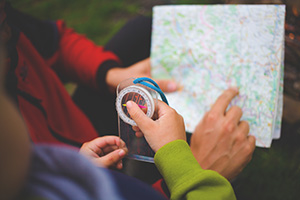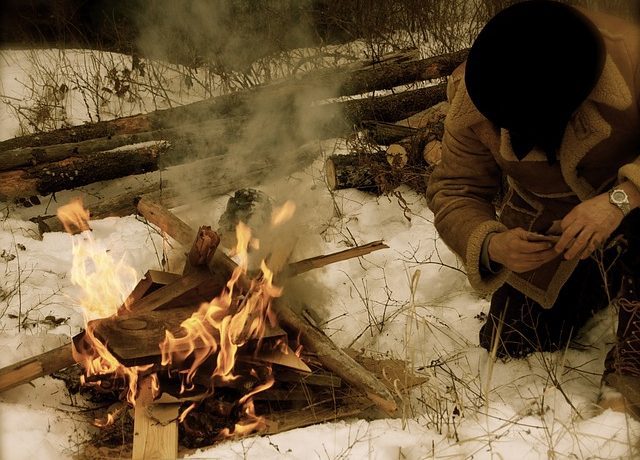No matter whether you’re planning to go on a backpacking, hunting or camping trip. It’s a good idea to have some basic wilderness survival skills and knowledge.
Being prepared with such skills will help you to achieve two key things.
Firstly, if things don’t go to plan, you do have a plan, don’t you? Your wilderness survival skills will help you to better survive the unexpected. Whether you find yourself stuck out in the wild for longer than you planned or you face an unexpected disaster.
Secondly, learning some basic wilderness survival skills will help you to travel lighter and move quicker. Whilst there will always be a need to carry certain essential gear items. The ability to improvise and use your skills will reduce the weight you have to carry and give you the peace of mind to know you can deal with whatever comes up.
The key to wilderness survival is to make sure you have the ability to keep warm, dry, hydrated and uninjured. You also need to be able to find your way out of the wilderness. And until you do a food source will help you to keep your energy levels up.
Below is a list of nine easy wilderness survival skills that you can consider using:
Nine Easy Wilderness Survival Skills


1. Hypothermia
One of the biggest wilderness issues that can endanger life is hypothermia, and learning to stay dry is one of the more important survival skills. Getting wet is the biggest cause so get into the habit of watching out for ledges or other man-made or natural structures that you can shelter under when you think that rain may be coming.
2. Dried Moss or Milkweed Fuzz
The ability to start a fire is essential and natural materials found in the wild like dried moss or milkweed fuzz can help you to get that fire going. As you walk along if you spot some dried moss or milkweed fuzz, put it in your backpack or in your pocket. This will provide you with dry tinder to start a fire, just in case, it’s raining later. You can also try experimenting with different materials.
3. Dry Leaves & Dead Grass
As already mentioned staying dry and keeping warm is key if you want to avoid hypothermia. If you find yourself stranded out in the wilderness without your sleeping bag. Using a pile of dry leaves and or dead grass can help to provide insulation and keep you warm in an emergency.
4. Navigation


If you lose your compass or it fails you. Using natural navigation techniques can help get you out of danger. One way to help you out in a jam is to put a stick or small branch upright into the ground and mark the tip of the shadow. Mark it again fifteen minutes later and scratch a line between the first and second marks. This line will point you in an easterly direction and help you to get your bearings.
Related: 6 Essential Maps to Store Before an EMP
5. Storm Awareness
Getting caught in a storm isn’t great at the best of times. Getting caught in one whilst out in the wilderness is even worse. Being struck by lightning can often be fatal so learn to use your natural surroundings for signs of a storm brewing. For example, clouds often form in the Rocky Mountains just before the afternoon storms in summer. Birds often fly lower before storms. Learning to read the sky and the behavior of animals can keep you out of trouble.
6. Hydration
It’s a fact that you won’t survive very long or get very far without the regular intake of water. Keeping yourself hydrated at all times is extremely important. If you’re stuck out in the wilderness for longer than expected and your water supplies are running low or worse completely depleted. You will need to find water sources and top up so get into the habit of filling up your water bottles every chance you get. When you find a drinkable water source remember to drink up the last of your water right before you fill the bottles too.
7. Wild Foraging


Whilst second to water it’s still important to eat safe foods that will help to keep your energy levels up. Take some time to research the basics of wild edibles and foraging. Learn what’s safe and what’s not safe to eat, make sure you carry out more research specific to the area you plan to travel to before starting out.
8. Natural First Aid
Try cutting into the trunk of a small spruce or fir tree. The tree sap that oozes out can be used as an antiseptic dressing for small cuts and grazes. It also can be used to start a fire because it will burn when wet.
Related: 16 Remedies for Radiation Exposure
9. The White Birch Tree
Bark from a white birch tree will usually light even when wet so can help you to get a fire going when its raining. It can also be used as a substitute for paper and help you to leave a note in an emergency.
Wilderness Survival Skills Conclusion
Whilst not an exhaustive list these are a few wilderness survival tips and techniques that you can easily learn. There are many more that can help you to survive in unexpected wilderness survival situations. You’ve probably got some tips of your own that you have used in the past. If you have we would love to hear about them in the comments section below.





















